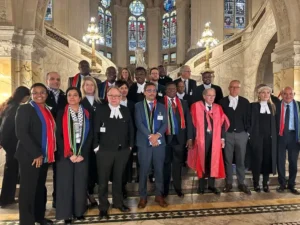The New Zealand High Court in Christchurch returned a guilty verdict this week against Lauren Dickason, a 42-year-old Pretoria native, convicted on three counts of murder. The case has prompted South Africans to express admiration for the speed and efficiency of New Zealand’s judicial system, drawing unfavorable comparisons with the pace of legal proceedings in their own country.
Dickason was arrested on the night of September 16, 2021, for the murder of her three children. She made her first court appearance on June 1, as reported by New Zealand media. Her trial officially commenced on July 17, culminating in a guilty verdict delivered by 11 out of 12 jurors on August 16, just over one year after her initial arrest.
Comparing Judicial Systems
The trial’s rapid conclusion has sparked a debate among South Africans, many of whom took to social media platforms like Facebook to voice their thoughts. A recurring sentiment was the desire for South Africa’s justice system to emulate New Zealand’s efficiency. Comments on an article by IOL, a South African news outlet, conveyed frustration at the slow pace of South African courts.
One user highlighted the delays in the case against Timothy Omotoso, a Nigerian senior pastor at Jesus Dominion International Church in Durban, who has been accused of raping more than 10 women. Arrested on April 20, 2017, Omotoso has been in custody for six years without a verdict. This delay stands in stark contrast to the rapid adjudication of the Dickason case, which took a little over a year from arrest to verdict.
“Trial took just over four weeks. Beautiful. Not what is done here. Look at this Omotoso trial dragging for so long,” said Nkosazana Radebe on Facebook.
“Justice system SA, take note, just over 1 year case done, not frigging 9 years as in SA,” echoed Des Cauvin Jacobs.
Broader Implications
While the comments are an expression of public sentiment, they also raise questions about the underlying factors contributing to the slow pace of South Africa’s judicial system. Is it a matter of administrative inefficiency, lack of resources, or something deeper? These are concerns that warrant further investigation, as they have broad implications for justice and the rule of law in the country.
It’s also worth noting that a swift trial is but one aspect of a judicial system. Speed should not come at the expense of thoroughness and fairness, values that are foundational to any robust legal framework.
As the Dickason case prompts reflection among South Africans, it underscores the broader dialogue about judicial efficacy, not just in South Africa but globally. It serves as a reminder that while justice delayed is justice denied, the ultimate aim should be a system that is both expedient and just.














